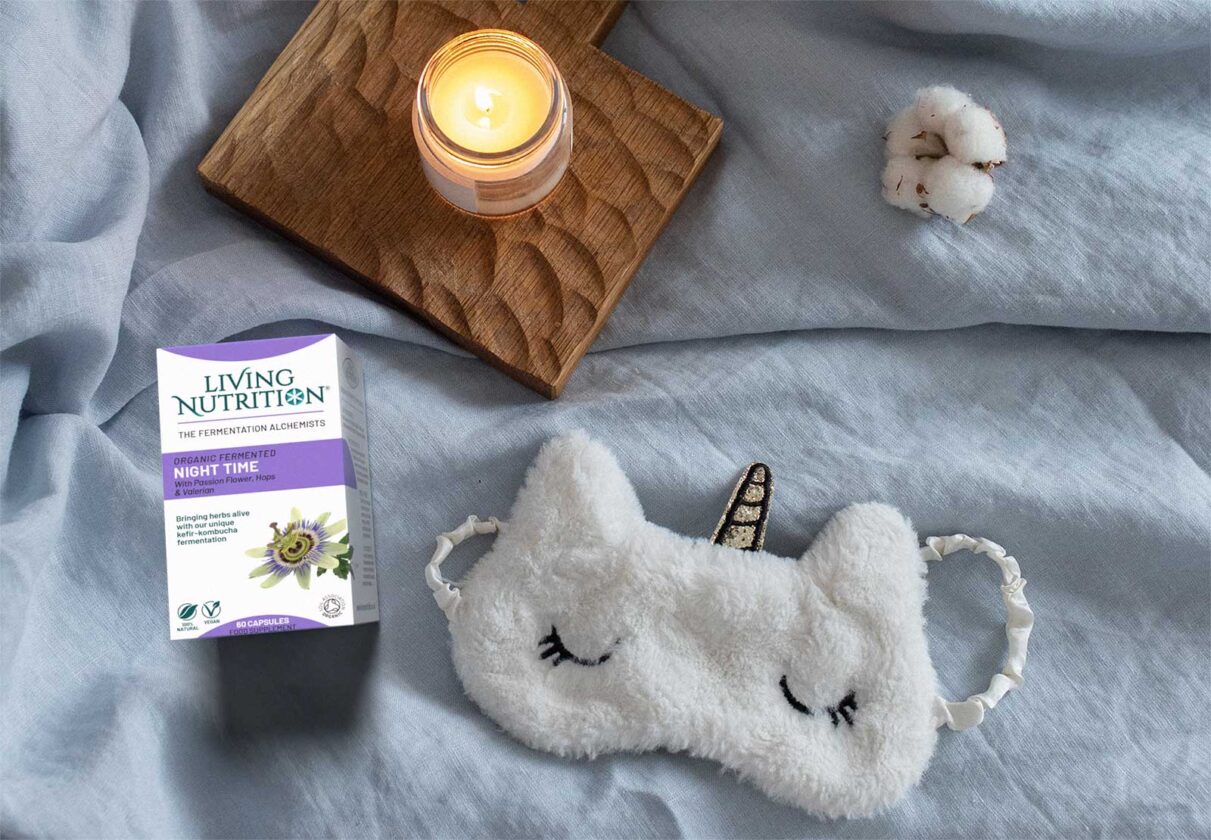
It’s supposed to be easy, isn’t it? Your head hits the pillow, you fall asleep and wake up when the alarm rings. Right?
And yet… one in three people in the UK say they struggle to sleep at least once a week, with a fifth having trouble falling asleep every single night. During the Covid-19 pandemic, Google searches for sleep and insomnia almost doubled during the first year!
If you’re one of the many struggling to sleep through the night, here’s our guide to getting more Zz’s.
In this blog you’ll learn:

Most people will experience sleep disruption at some stage; however, if insomnia becomes chronic, lasting 3 months or longer, it can interfere with your quality of life.
Stress is one of the commonest causes of insomnia. Stress puts the nervous system on ‘red alert’. Cortisol and adrenalin are ‘fight or flight’ hormones, and if these are released at night—when you should be relaxing—they play havoc with your body’s natural sleep signals.
Inflammation also causes cortisol levels to rise and may lead to higher levels interfering with sleep hormones such as melatonin.
Blue light from phones and laptop screens prevents the release of adequate melatonin.
Alcohol or other stimulants can disturb the REM sleep cycle and cause you to wake during the night. Alcohol is also dehydrating, which can cause wakefulness.
Hunger, fasting, or conversely eating a heavy meal can cause digestive issues and prevent sleep.
How much sleep you need a night will vary according to yourage and health status; however, the consensus is that most adults need between 7 – 9 hours’ sleep per night.
Did you know? Your grandmother had it right: what time you go to bed really does make a difference to your quality of sleep! Light levels regulate an area in the brain called the pineal gland which controls cellular functions linked to the body’s rest and repair. These ‘switch on’ in the first 90 minutes before midnight.
So, what are the health benefits of sleeping well? The brain requires sufficient sleep to organise all the information it’s learnt throughout the day, and to make memories. Your immune system needs sleep to enhance the activity of white blood cells to destroy infections and pathogens and to ‘clean house’ of old cells, bacteria, and other waste. Sleep helps to regulate your hormones and mood and improves concentration.
The best ways to achieve a deep sleep will depend on the type of sleep disturbances you’re experiencing. For example:
Do you find it hard to switch off at night and wind down? Prepare for better sleep by practising good sleep hygiene.
Practise letting go of the day’s events. Try this exercise based on energy medicine techniques:
There are lots of herbs that have been used over the centuries to induce relaxation and sleep. Valerian and lemon balm are ideal for when you’re holding onto nervous tension. Passion flower can help to settle the mind before sleep. Hops has historically been used to improve sleep quality and to induce deep sleep. Lavender’s sensory compounds are calming and relaxing. Living Nutrition’s Organic Fermented Night Time contains 3 revered herbs including valerian, passion flower and hops to support a healthy sleep routine.

Did you know: Hops has been used in Europe for its sedative qualities since the 9th century. Agricultural workers who worked in the fields harvesting hops were noted for falling asleep on the job!
Finally, if you can’t fall asleep, don’t panic! Getting frustrated trying to ‘fix’ the problem can be counterproductive and make you feel more stressed. You will get through your day, and you will be OK. Move forward with positive changes, and you will change the cycle.
Share this post
| Cookie | Duration | Description |
|---|---|---|
| __stripe_mid | 1 year | Stripe sets this cookie cookie to process payments. |
| __stripe_sid | 30 minutes | Stripe sets this cookie cookie to process payments. |
| _abck | 1 year | This cookie is used to detect and defend when a client attempt to replay a cookie.This cookie manages the interaction with online bots and takes the appropriate actions. |
| ak_bmsc | 2 hours | This cookie is used by Akamai to optimize site security by distinguishing between humans and bots |
| bm_sz | 4 hours | This cookie is set by the provider Akamai Bot Manager. This cookie is used to manage the interaction with the online bots. It also helps in fraud preventions |
| cookielawinfo-checkbox-advertisement | 1 year | Set by the GDPR Cookie Consent plugin, this cookie is used to record the user consent for the cookies in the "Advertisement" category . |
| cookielawinfo-checkbox-analytics | 11 months | This cookie is set by GDPR Cookie Consent plugin. The cookie is used to store the user consent for the cookies in the category "Analytics". |
| cookielawinfo-checkbox-functional | 11 months | The cookie is set by GDPR cookie consent to record the user consent for the cookies in the category "Functional". |
| cookielawinfo-checkbox-necessary | 11 months | This cookie is set by GDPR Cookie Consent plugin. The cookies is used to store the user consent for the cookies in the category "Necessary". |
| cookielawinfo-checkbox-others | 11 months | This cookie is set by GDPR Cookie Consent plugin. The cookie is used to store the user consent for the cookies in the category "Other. |
| cookielawinfo-checkbox-performance | 11 months | This cookie is set by GDPR Cookie Consent plugin. The cookie is used to store the user consent for the cookies in the category "Performance". |
| elementor | never | This cookie is used by the website's WordPress theme. It allows the website owner to implement or change the website's content in real-time. |
| PHPSESSID | session | This cookie is native to PHP applications. The cookie is used to store and identify a users' unique session ID for the purpose of managing user session on the website. The cookie is a session cookies and is deleted when all the browser windows are closed. |
| viewed_cookie_policy | 11 months | The cookie is set by the GDPR Cookie Consent plugin and is used to store whether or not user has consented to the use of cookies. It does not store any personal data. |
| Cookie | Duration | Description |
|---|---|---|
| _mcid | 1 year | This is a Mailchimp functionality cookie used to evaluate the UI/UX interaction with its platform |
| mailchimp_landing_site | 1 month | The cookie is set by MailChimp to record which page the user first visited. |
| Cookie | Duration | Description |
|---|---|---|
| _ga | 2 years | The _ga cookie, installed by Google Analytics, calculates visitor, session and campaign data and also keeps track of site usage for the site's analytics report. The cookie stores information anonymously and assigns a randomly generated number to recognize unique visitors. |
| _gat_gtag_UA_57442626_1 | 1 minute | Set by Google to distinguish users. |
| _gcl_au | 3 months | Provided by Google Tag Manager to experiment advertisement efficiency of websites using their services. |
| _gid | 1 day | Installed by Google Analytics, _gid cookie stores information on how visitors use a website, while also creating an analytics report of the website's performance. Some of the data that are collected include the number of visitors, their source, and the pages they visit anonymously. |
| Cookie | Duration | Description |
|---|---|---|
| _fbp | 3 months | This cookie is set by Facebook to display advertisements when either on Facebook or on a digital platform powered by Facebook advertising, after visiting the website. |
| fr | 3 months | Facebook sets this cookie to show relevant advertisements to users by tracking user behaviour across the web, on sites that have Facebook pixel or Facebook social plugin. |
| test_cookie | 15 minutes | The test_cookie is set by doubleclick.net and is used to determine if the user's browser supports cookies. |
| Cookie | Duration | Description |
|---|---|---|
| _tcfpup | 5 years | No description available. |
| _tcSecSess | session | No description available. |
| _tcSessInfo | session | No description available. |
| CookieLawInfoConsent | 1 year | No description |
| cookies.js | session | No description available. |
| m | 2 years | No description available. |
| ti_ukp | 5 years | No description available. |